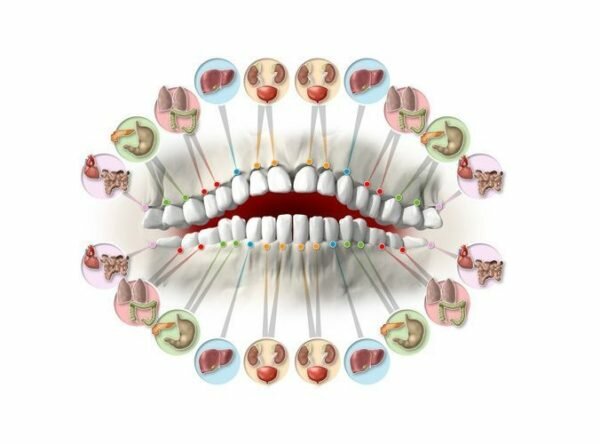
Even the slightest tooth pain or damage may signify a problem associated with the internal organs. Therefore, if you know about this connection, you can easily find out which internal organ is making you sick. There are also other relations among the teeth and the human organism. For example, damaged teeth can often cause headaches.
According to experts, the central and lateral incisors of both jaws, can reveal you the condition of your kidneys and bladder. The canine teeth can tell the condition of the liver and bile. The first and second premolars reveal the state of the lungs and colon, while the molars tell the state of the gall bladder, spleen and pancreas. And lastly, the wisdom teeth can reveal you the health of your heart and small intestine.
Do not get this wrong. Not every disease affecting the internal organs reflects as a teeth damage, or pain. Sometimes, a toothache can be just that and mean that the affected tooth needs to be repaired, or removed. What we talk about here is the so-called phantom pain. It usually occurs due to a signal sent by the damaged internal organs to the teeth.
The Connection Among Damaged Teeth And Damaged Internal Organs
What you need to know is that feeling pain in the first and second incisors, often indicates chronic pyelonephritis (infection of the upper urinary tract); cystitis (bacterial infection of the bladder); and otitis media (ear infections).
Pain in the first incisors can be an indicator of tonsillitis and osteochondrosis, a joint disease. In case of a cholecystitis, an acute inflammation of the gallbladder walls, or hepatitis, you might feel a constant dull ache in these front teeth.
Aching premolars indicate to colitis, chronic pneumonia or allergic reactions, such as asthma and rhinosinusitis.
Pain in the first premolars, upper and lower, might tell you that you probably have a problem with the knee joints and shoulders. Also, you may be suffering from an inflammation, associated with arthritis and bowel diseases.
Aching upper molars are an indicator of gastritis, gastric ulcer, pancreatitis, anemia and duodenal ulcers.
Pain in the upper sixes is associated with tonsillitis and sinusitis, tumors of the thyroid gland, inflammation of the ovaries and spleen. Pain in the lower molars indicates a problem with the arteries and atherosclerosis.
Experts say that the problems with the seventh molars of the lower jaw point out to problems with the veins, lungs (such as bronchitis and asthma), and the presence of polyps in the colon.
Having problems with the last molars, or the wisdom teeth, may point out to problems with the heart and congenital defects. Tooth decay and caries warn of problems with the endocrine system and stomach ulcers.
Source http://healthawarenesscommunity.com/
All content on this Web site, including medical opinion and any other health-related information, is for informational purposes only and should not be considered to be a specific diagnosis or treatment plan for any individual situation. Use of this site and the information contained herein does not create a doctor-patient relationship. Always seek the direct advice of your own doctor in connection with any questions or issues you may have regarding your own health or the health of others.